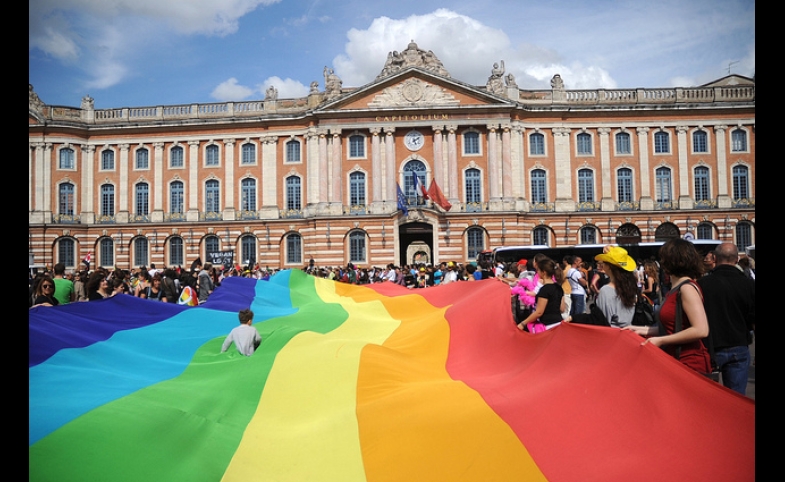Recent developments in Africa related to the contentious topic of homosexuality have reminded me of a discussion that took place during one of the interactive sessions at CPD’s 2013 Summer Institute in Public Diplomacy....
KEEP READINGThe CPD Blog is intended to stimulate dialog among scholars and practitioners from around the world in the public diplomacy sphere. The opinions represented here are the authors' own and do not necessarily reflect CPD's views. For blogger guidelines, click here.

Attitudes Toward Homosexuality Vary Widely Across Globe
In our international surveys at the Pew Research Center, we explore how people in countries around the world differ on a wide range of political, economic, and social topics. But very few issues generate the kind of differences we see when we ask about homosexuality.
A 2013 Pew Research survey asked people in 40 countries whether they believe homosexuality is morally acceptable, morally unacceptable, or not a moral issue. Across the nations polled, a median of 59% said homosexuality is unacceptable. Larger percentages considered extramarital affairs and gambling unacceptable. Meanwhile, fewer respondents said this about abortion, premarital sex, alcohol use, divorce, or contraception.

Overall, the most negative views about homosexuality were found in the Middle East, with nine-in-ten or more Jordanians, Egyptians, Palestinians, and Tunisians saying it is unacceptable. Israelis are the clear outliers in the region (43% say unacceptable).
Attitudes are also overwhelmingly negative in sub-Saharan Africa. Solid majorities in all six African nations polled deemed homosexuality unacceptable, including a nearly unanimous 98% in Ghana, and 93% in Uganda, whose president signed an extremely severe law against homosexual behavior in February, although the law was subsequently struck down by a court on technical grounds.
Across the nations polled, a median of 59% said homosexuality is unacceptable. Larger percentages considered extramarital affairs and gambling unacceptable.
A median of 65% across the Asian nations in the survey said homosexuality should not be accepted, although views vary considerably across the region. Large majorities in the predominantly Muslim nations of Indonesia (93%), Malaysia (88%), and Pakistan (85%) believe homosexuality is morally unacceptable, as do somewhat smaller majorities in India (67%), the Philippines (65%), China (61%), and South Korea (57%). However, just 31% of Japanese and 18% of Australians hold this view.
There are also wide differences across Latin America. Salvadorans express the most intolerant attitudes (70% unacceptable), while about half feel this way in Bolivia (51%) and Venezuela (49%). Mexicans (40%), Brazilians (39%), Chileans (32%) and Argentines (27%) are less likely to believe homosexuality is unacceptable.
Europeans express the least negative views on this issue. In none of the eight European Union countries surveyed does a majority say homosexuality is morally unacceptable, although more than four-in-ten do hold this view in Greece and Poland. At 8% and 6% respectively, Germany and Spain are the only countries where fewer than one-in-ten consider homosexuality unacceptable.
In the U.S. and many other nations, young people are much less likely than their older counterparts to describe homosexuality as morally unacceptable.
Meanwhile, 37% of Americans believe it is unacceptable, a relatively high number among advanced economies. However, American attitudes have grown more tolerant in recent years. For instance, in 2001 only 35% supported same-sex marriage, compared with 52% in 2014.
In the U.S. and many other nations, young people are much less likely than their older counterparts to describe homosexuality as morally unacceptable. While 46% of Americans ages 50 and older say it is unacceptable, just 28% of 18-29 year-olds say the same. The most striking age gap is found in South Korea, where 79% of people 50 and older believe homosexuality should not be accepted, compared with only 28% of those under 30.
There is also a strong relationship between a country’s level of religiosity and views on this issue, with negative opinions much more common in countries where religion plays a central role in people’s lives. The share of the public saying homosexuality is morally unacceptable tends to be particularly high in nations where large numbers say religion is very important to them, pray at least once a day, and think it is necessary to believe in God to be moral. Meanwhile, acceptance of homosexuality is more common in countries with low levels of personal religiosity, such as the relatively secular nations of Western Europe.
Visit CPD's Online Library
Explore CPD's vast online database featuring the latest books, articles, speeches and information on international organizations dedicated to public diplomacy.
POPULAR ARTICLES
-
January 29
-
January 20
-
January 28
-
February 6
-
January 8
Join the Conversation
Interested in contributing to the CPD Blog? We welcome your posts. Read our guidelines and find out how you can submit blogs and photo essays >.












